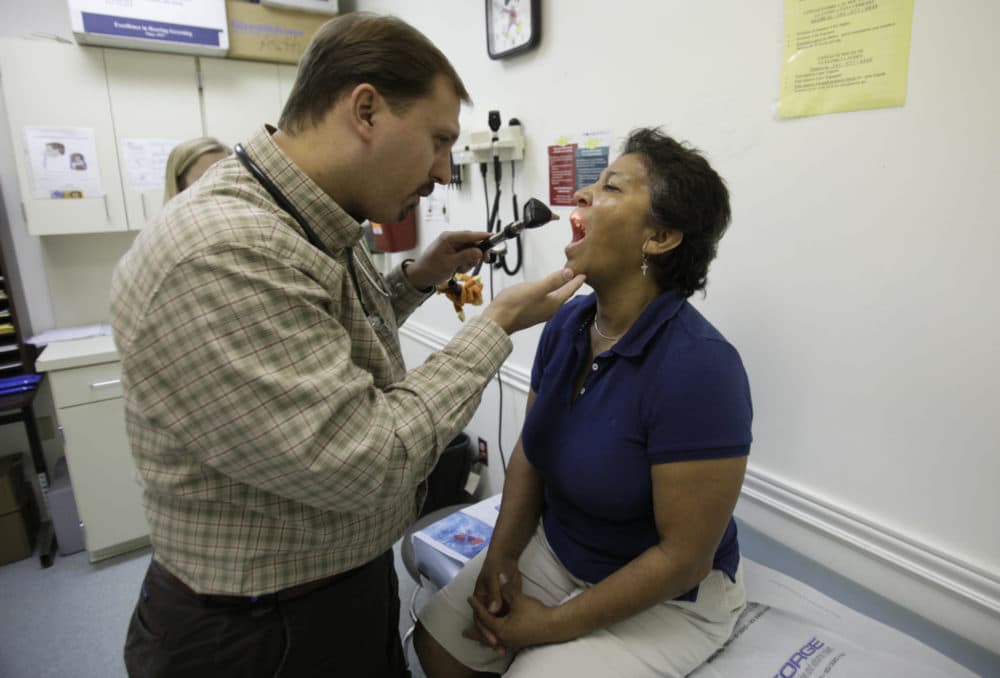Advertisement
Are Immigrants Health Care 'Moochers'? On The Contrary, Boston Researchers Say

More than half of Americans think immigrants are at least partly responsible for the nation's high health care costs.
Moreover, there's a widespread notion that immigrants — especially those in the country illegally — are siphoning off resources intended to pay for the health care of native-born Americans.
The Trump administration is considering a rule change that would bar new immigrants deemed likely to draw on public benefits and prevent those already here from achieving permanent legal resident status if they do.
Many Americans support such policies. "If even one dollar is spent on any child here illegally," says Dr. Rob Tenery, a Dallas ophthalmologist who blogs about health and politics, "it's a dollar diverted from some other social services, unless they pay for it out of their own pockets."
Dr. J. Wesley Boyd, a psychiatrist and ethicist at Harvard-affiliated Cambridge Health Alliance, says many Americans "just have this sort of general conception that foreigners who are coming across our borders trying to get a better life for themselves...[are] all just moochers."
Boyd spends a lot of his time advocating for immigrants — in particular, testifying on behalf of those seeking asylum. So he was receptive when Tufts Medical School student Lila Flavin proposed a deep dive into the question: Just how much of a drain on the U.S. health care system are immigrants?
Their analysis, published in the International Journal of Health Services, may surprise many.
Are Immigrants Draining U.S. Health Care?
Combing through 188 studies published since 2000, they focused on the 16 that were most solid. That research showed that immigrants — both legal and undocumented — consume far less health care than Americans born in this country.
"Regardless of age group, immigration status or whether or not they're insured, immigrants spend half to two-thirds as much as U.S.-born" on health care, Flavin says. "They make up roughly 12 percent of the U.S. population but account for 8.6 percent of health care spending."
Undocumented immigrants make up 5 percent of the population, but account for only 1.4 percent of health care spending.
There are a lot of explanations, she says. "There are more barriers to care, such as language. Recent immigrants are younger and healthier than the average U.S.-born American." Many may be reluctant to seek care.
Flavin and her colleagues also found that immigrants pay more out of their own pockets for health care -- in other words, they're not just drawing on tax-supported programs. "Low-income immigrants are much more likely to spend half their income on out-of-pocket payments — 33 percent of them do, versus 12 percent among U.S.-born," Flavin says.
Others have called attention to lower health spending among immigrants. But the new study raises a pointed question: Do immigrants cost the U.S. health system more than they pay in?
The new study can't definitively answer that question, but Boyd, the senior author, says it points in that direction.
"Immigrants' expenditures for health care are much, much less than native borns'," he says. "What that means is they are subsidizing U.S. health care. Our data are very clear that the more immigrants we have in any insurance pool, the healthier that insurance pool will be financially."
Net Gain... Or Net Drain?
Steven Camarota of the Center for Immigration Studies, a Washington-based group that favors limiting admission to better-educated immigrants or those who have needed skills, says he's not ready to conclude that current immigrants represent a net gain to the U.S. health care system rather than a net drain.
He concedes it's true for Medicare, the federal program for the elderly and disabled. "We think about 55 percent of illegal immigrants pay into Medicare through payroll deductions," Camarota says. "So they're a net benefit to the program, with one very important caveat — they've got to stay illegal. Otherwise they'll eventually add to the insolvency of Medicare."
For younger immigrants the net gain/drain situation is less clear. Camarota says immigrants over age 18 are much more likely to be on Medicaid. But it's not known whether their lower medical expenditures are enough to offset their greater enrollment.
"On balance, my opinion is immigrants are a net drain on the publicly financed part of our health care system," Camarota says. "But it may not be as big a drain as some people imagine."
Boyd says he doesn't expect the new analysis to change many people's entrenched conceptions about the burden that immigrants pose to the nation's social networks. "Any single piece might convince only a few people to change their minds," he says. "But if people start seeing it over and over, maybe it will start to sink in. It's a Sisyphean task."
Correction: An earlier version of this story said the Trump administration is considering an executive order, not a rule change, regarding immigrant benefits. We regret the error.
This article was originally published on August 08, 2018.